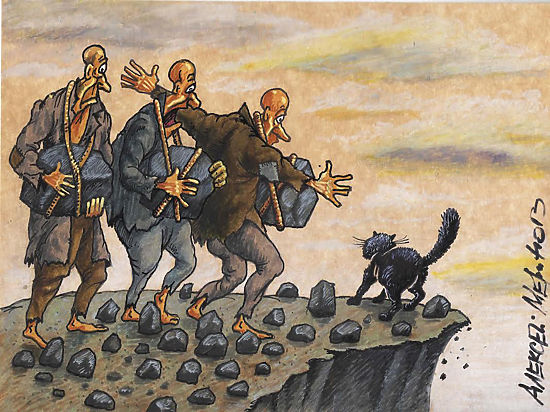
87% of the benefits paid to those who does not need them .
19% of poor people in the country do not receive social support. While 87% of those who enjoyed various privileges and benefits do not need them. To such conclusion analysts of the world Bank and the Scientific research financial Institute of the Ministry of Finance of the Russian Federation. On social security of the population, the government spends 3% of GDP and revenue deficit of all the poor countries is about 1% of GDP. Therefore, if at least 29% of spending on social programs has got to address the problem of poverty in Russia would be resolved.
In a research note, “Effective social support of the population. Version 3.0: targeting, neediness, universality”, which is an intermediate result of the global study, says: to one fifth of really poor people (those whose income per family member is below subsistence minimum) in social services do not reach.
A large part of the support measures is the promotion of the citizens having special merits before the state (139 measures), to ensure the attractiveness of civil service or service in high risk environments (117 measures). The most numerous category of citizens receiving social assistance is the veterans of labor and agriculture specialists. According to experts, it is not the most vulnerable categories of citizens.
— There is a category of recipients of social assistance as veterans of labor, — explained the “Izvestia” Elena Avraamova, doctor of economic Sciences, Professor, Institute for social analysis and forecasting Ranhigs. — In the labour market where job changes very often, the reward for persistence at work makes no sense. From sociological research it is known that some veterans just don’t take advantage of these benefits.
According to the study, state social programmes (excluding pensions) covered 71% of the population. In this case the total number of poor 19% did not receive social support. These figures were calculated according to the sample observations of income of the population of the Federal state statistics service (VNDN) and Rosstat.
— Apparently, those citizens who for various reasons are not able to communicate with the social security authorities, — assumes Elena Avraamova. — Because to appointed assistance, it is necessary for her to handle. If there are no appeals, social security will not initiate communication with the citizens.
According to experts, in Russia there are no such structures, which monitor the situation of vulnerable categories of citizens and told them about possible sources of social assistance.
— There is a problem of awareness of people of their social benefits — notably it occurs to those who do not speak the new information technologies, — said Elena Avraamova.
The authors of the study concluded that targeted benefit (the most effective assistance to the poor appointed on the basis of income), the monthly child allowance, subsidy for housing, benefits in difficult life situations, reach only up to 41% of those in need.
Coverage in need of targeted assistance programmes varies between regions. Minimum rates in Khanty-Mansi Autonomous Okrug and Kaluga (less than 20%) and in Karelia (less than 30%), Bryansk region, Tyumen and Ryazan (a little over 40%). Best of all, the situation in Chechnya, Buryatia, Veliky Novgorod, Krasnoyarsk and Dagestan and Kamchatka region (80 to 90%).
— Regional differentiation of social assistance is very large, because the social support is coming from regional budgets, — says Elena Avraamova. Some regions cope with the problem better than others. In poor regions there is almost no capacity to provide social services — it does not have the funds. There is also a lack of actors that would enter into public-private partnership and would help the state to provide these services. Among the problematic Tyva, Mari El and other. The poorer the region, the greater the problem. And measures and budgets is not yet accepted, although the question is already on the agenda.
The existing scheme of aid allocation leads to the fact that every ruble spent from the regional budget for targeted measures, reducing the deficit of income of the poor (lack of funds compared to the minimum subsistence level) to a maximum of 28 cents.
The reason for the low efficiency of targeted help, the researchers also believe the low amount of targeted social benefits. The average regions their share in the income of the poorest population does not exceed 2%.
The study’s authors believe that even in the economic downturn, there are effective “treatments” of the system of social support of the population.
“If you look at the whole picture, it is clear that the money for targeted measures simply does not remain — the lion’s share of funds spent on support of preferential categories established by Federal law. Regions can only enhance the “targeting” of targeted benefits, but the poverty problem will not solve it,” — said in a research note.
To solve the problem, the authors propose to improve the methodology of assessing the real situation of the poor citizens, and to consolidate and simplify the system of support, which is now very cumbersome, making it difficult to control.
A set of measures, assign different departments, experts propose to replace the universal allowance, which will combine child benefits, subsidies for housing and utilities, unemployment and other measures of social support.
The authors want to simplify the system of social protection, but, in my opinion, this is not quite correct because here we have to consider a variety of needs, which in this area is very high, — said Elena Avraamova. — If to unify this system, there will be more minuses than pluses. Diverse system is better balanced. In the case of universalization of the problem of inclusion-exclusion will remain, because there is no such principle that would take into account all those in need. If the agencies that provide services, will be a lot more people get into the sphere gross social protection. However, the criteria need to be adjusted: to move from categorical measures to address, to provide well-targeted programs. It would be more efficient.
The expert said that the work on reconstruction of the social assistance system is already underway — development of principles for the allocation of aid, taking into account all resources of the household goes on a scientific level, upon request of the Center for strategic research (CSR). The principle of future adjustments is to ensure that the reform has not suffered any category of the population, because the issue of social payments is a very sensitive area, especially now that the financial situation of the citizens has deteriorated significantly.
— Movement towards the targeting of assistance is a long time, ” said Elena Grishina, head of the laboratory of the Institute of social analysis and forecasting Ranhigs. — Now once again at the highest level have expressed the need to focus assistance to those most in need. In the regions implemented the criterion, set additional thresholds for beneficiaries depending on their income, not necessarily below the subsistence minimum). Most often the regions do not go the way of imposing severe restrictions, because it can lead to social explosions, but trying to cut social assistance enough wealthy citizens. Also announced the creation of a “social Treasury” system, which will combine data on the various beneficiaries and enables you to consolidate information about all the payments to each household. While this information is so fragmented that it is difficult to understand how or that the family deserves the help that she provided. Experts hope that the increase in the efficiency of the entire system will free up funds and reallocate them to increase social benefits.









